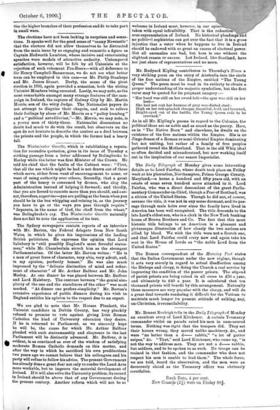Mr. Rudyard Kipling contributes to Thursday's Times a
very striking poem on the entry of Australia into the circle of the free nations of the Empire, entitled "The Young Queen." The poem must be read in its entirety to obtain a proper understanding of its majestic symbolism, but the first verse may be quoted for its poignant imagery :—
" Her hand was still on her sword-hilt—the spur was still on her heel—
She had not cast her harness of grey war-dinted steel : High on her red-splashed charger, beautiful, bold, and browned, Bright-eyed out of the battle, the Young Queen rode to be crowned."
As in all Mr. Kipling's poems in regard to the Colonies, the political ideas are as noble and as sound as the poetry. Here, as in "The Native Born" and elsewhere, he dwells on the existence of the free nations within the Empire. His is no Jingo dream of a Roman or semi- Oriental Empire dominating but not uniting, but rather of a family of free peoples gathered round the Motherland. That is the old Whig ideal so often derided and misunderstood, but now working itself out in the inspiration of our sanest Imperialist.


















































 Previous page
Previous page